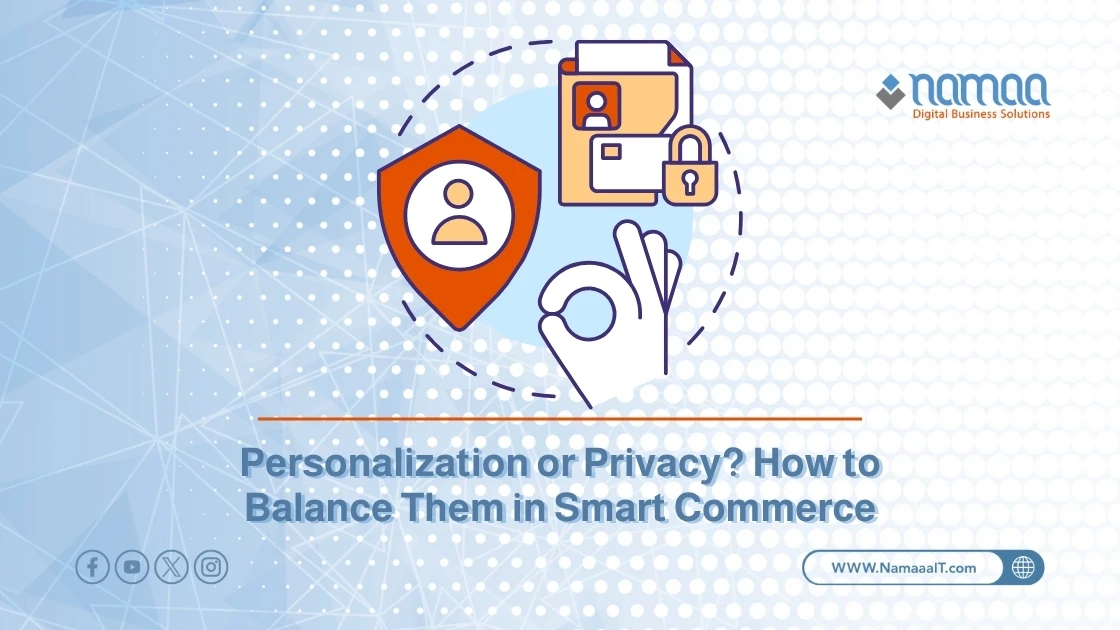In the era of smart commerce, personal data has become a vital tool for brands aiming to enhance user experience and increase marketing effectiveness. As the reliance on personalization to deliver targeted and relevant offers grows, the issue of privacy emerges as a major challenge for both businesses and consumers. While companies strive to personalize experiences to boost loyalty and drive sales, consumers remain cautious of potential threats to their privacy. In this article, we will explore how to balance personalization that enhances commercial experiences with privacy that protects user rights, highlighting strategies businesses can adopt to succeed in today’s smart commerce environment.
What is Personalization in Smart Commerce?
Personalization in smart commerce is the process of using consumer data—such as purchase behavior, interests, geographic location, and more—to create customized shopping experiences that meet individual needs and preferences.
This personalization relies on AI and data analytics tools that allow companies to target the right offers and products to the right users at the right time and place. Data is collected through interactions on websites, mobile apps, and social media, enabling companies to tailor offers and ads according to each user’s interests.
Thanks to personalization, consumers enjoy more relevant experiences, leading to higher satisfaction and purchase motivation. However, despite its benefits in improving personal experiences and increasing revenue, personalization demands careful data management to avoid privacy risks. These processes can be complex, requiring a delicate balance between delivering excellent service and protecting customer information.
Privacy in Smart Commerce
Privacy in smart commerce is a critical issue that companies must handle with care. With increasing use of personal data to improve user experience, consumers are significantly concerned about how their data is collected and used. Privacy refers to the right to control the personal information collected about an individual and to ensure it is used securely.
In smart commerce, companies handle sensitive data such as names, email addresses, and payment details, making it essential to protect this information. To comply with regulations like the EU’s General Data Protection Regulation (GDPR), companies must obtain explicit customer consent before collecting data and implement strict security measures to prevent theft or leaks.
Neglecting privacy can lead to a loss of customer trust and damage to a company’s reputation. Therefore, businesses must invest in advanced security technologies, such as encryption and secure data storage, and maintain transparency in privacy policies to mitigate these risks.
How Does Personalization Enhance the Online Shopping Experience?
Personalization significantly enhances the online shopping experience by making it more tailored and relevant for shoppers. When users encounter products or offers that match their interests or needs, they feel more confident and satisfied in the purchase process. Websites can display personalized recommendations based on previous purchases or items clicked.
These suggestions make shopping smoother and more intuitive, increasing the likelihood of a purchase. Additionally, personalization strengthens the bond between brand and customer, as customers feel valued—boosting their loyalty. For instance, when a website offers special deals on products a customer might be interested in, based on browsing history, it often results in higher conversion rates.
By refining the shopping process and offering accurate suggestions, personalization improves the overall experience and contributes to online commercial success. However, a careful balance must be struck to avoid making users feel overly surveilled.
How Does Personalization Improve Marketing Campaign Effectiveness?
Personalization greatly enhances the effectiveness of marketing campaigns by making brand messaging more precise and relevant. By analyzing customer behavior data, businesses can create targeted marketing campaigns with personalized messages and offers—boosting customer engagement and conversion rates.
For example, if a brand knows a customer has shown interest in certain products, it can send tailored promotions related to those items. Such campaigns benefit from providing customized experiences, helping companies reach their audiences more effectively while increasing cross-selling or upselling opportunities.
Furthermore, data-driven personalization reduces advertising waste by targeting individuals most likely to interact with the product or service, optimizing marketing budgets and increasing ROI. It also boosts credibility and continuous customer engagement, fostering long-term relationships.
Personalization and Privacy: Where are the Red Lines?
The true challenge in smart commerce lies in striking the right balance between personalization and privacy. While personalization is a powerful tool for enhancing customer experience and increasing sales, overstepping in data collection and use can harm user privacy.
Even when companies gather data like shopping habits or online interests, this must be done transparently. Customers need to know what data is collected and how it’s used, and companies must obtain explicit consent.
Crossing these lines or exposing data to risk can damage a company's reputation and break customer trust. Therefore, companies must set clear standards that safeguard user privacy while still reaping the benefits of personalization.
A single mishandling of customer data can lead to leaks of sensitive information, causing significant legal and marketing damage. Personalization must be carefully and precisely managed to respect privacy and protect consumer data.
How Can Artificial Intelligence Solve the Personalization vs. Privacy Dilemma?
Artificial Intelligence (AI) can be a powerful tool to resolve the personalization vs. privacy dilemma in smart commerce. It helps companies strike a balance between delivering personalized experiences and protecting personal data. Using technologies like machine learning and advanced data analytics, AI can securely and efficiently process large data volumes—allowing for personalized content and offers without exposing sensitive information.
AI can develop algorithms that enable personalization without needing to collect or store sensitive data, thus preserving privacy. It can also identify patterns and behaviors from general data to customize offers based on individual interests without manipulating private information. Moreover, AI ensures that all privacy policies comply with legal regulations like GDPR, helping companies stay compliant.
With AI, businesses can achieve optimal personalization without crossing privacy boundaries, creating a smarter, safer, and more effective commerce environment.
Frequently Asked Questions
1. Can personalization limit the diversity of offers available to consumers?
Yes, excessive personalization may narrow the range of options consumers see based on past behavior. Over-filtering can cause “filter bubbles,” where users are repeatedly exposed to the same product types, reducing overall variety. Companies must balance personalization with diversity to enrich the shopping experience.
2. How can consumers protect their personal data during smart shopping?
Consumers should review privacy policies carefully before providing personal information. It’s wise to use strong passwords, enable two-factor authentication (2FA), and consider using VPNs—especially on public networks. Many platforms also offer customization settings to limit data collection.
3. How does personalization in smart commerce impact small and medium businesses (SMBs)?
Personalization can be a game-changer for SMBs, which often lack big ad budgets. Using digital tools, SMBs can leverage website or social media data to create targeted offers, enhancing campaign effectiveness and competitiveness against larger brands.
Summary
✅ Personalization enhances user experience: 79% of consumers prefer shopping on websites that offer personalized experiences based on their past behavior and interests.
✅ Privacy is a top priority in smart commerce: 63% of customers avoid businesses that lack strong data protection guarantees.
✅ Personalization boosts campaign effectiveness: Companies using personalized ads have seen a 19% increase in conversion rates compared to general campaigns.
✅ Personalization strengthens brand loyalty: 56% of customers who received personalized experiences were more willing to buy from the same brand again.
✅ AI helps balance personalization and privacy: 72% of companies using AI for data analysis reported improved offer personalization while maintaining data privacy






.webp)


